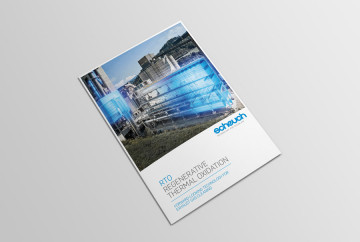Regenerative thermal oxidation (RTO compact) for odour reduction at the customer Nortura
Our customer Nortura is one of the largest food producers in Norway. The processing of animal products in Nortura's production operations can lead to odours. In the interests of local residents, it is necessary to keep odour problems as low as possible and to reliably reduce odours. The customer's existing exhaust gas cleaning system could no longer fulfil the official requirements, which is why an alternative solution was needed.
RTO compact for reliable odour reduction
Scheuch designed a customised RTO system with the help of which the exhaust gases produced are post-combusted, thus reducing odours. The RTO system comprises towers with regenerative heat storage, and the combustion chamber is heated electrically. The exhaust gas generated during food production slowly absorbs the high temperatures in the system and is heated to 850 °C in the combustion chamber, which reliably separates pollutants. A special flap cycle makes it possible to control the efficiency of the system. Thanks to a well-integrated heat recovery system, combustion is possible with no or very little use of additional fuels. With the RTO compact, Scheuch offers a system that takes up little space on the customer’s premises. Commissioning took place in February 2022. As part of the acceptance procedure, a measurement was carried out in accordance with the DIN EN 13725 standard, which confirmed that the Scheuch RTO system fulfils all official requirements.
Reference flow rate: 6,000 Nm3/h
Heating capacity max: 160 kW
Thermal efficiency: 94 %
Separation efficiency: 95 %
At the beginning of our collaboration, the customer was unsure which product would be most effective at reducing odours. To reduce the risk for our customer, Scheuch offered a hire/purchase option. This option allows the customer to test the product and familiarise themselves with the process directly on site at their premises. Fine adjustments can be made during operation. If, contrary to expectations, the system is unable to fulfil the conditions, the customer is given the opportunity to return the product to Scheuch. This significantly reduces the risk for the customer. What’s more, the hire/purchase option offers a particularly high level of agility. Scheuch works with the customer to solve the problem at hand and responds to the customer’s challenges and the customer process in an agile manner. Following the successful acceptance measurement, the customer Nortura decided to take over the system.
Our partner
Nortura is a large Norwegian industrial group with 30 production sites and around 4,600 full-time employees. Each year, 260,000 tonnes of meat and eggs are processed as part of the production process. Nortura is an important supplier to the Norwegian food market, the hotel and catering industry. The company is owned by an association of a total of 17,000 Norwegian farmers.
The regenerative thermal oxidation process (RTO) is used wherever VOCs (volatile organic compounds), CO, HCN or odours need to be removed from the exhaust air and therefore makes a major contribution to environmental protection. Thanks to a well-integrated regenerative heat recovery system, combustion takes place with little or no use of additional fuels. Scheuch RTO systems are characterised by high operational safety and flexible application options.
Scheuch offers a comprehensive range of system variants that utilise the thermal exhaust air cleaning process. Our solutions are specially tailored to the customer to ensure optimum service life, operational safety and energy consumption.
Highlights of the Scheuch RTO compact:
- High thermal efficiency of > 92 %
- High level of safety and durability thanks to corrosion-resistant ceramic heat exchangers
- Robust flap switching for high operational reliability
- Separation efficiency: >97 %
- Particularly compact design
- can be integrated as part of a specific overall solution from Scheuch (everything from a single source)
Expandability: if required, the RTO can be expanded to an RCO (from thermal to catalytic application)







